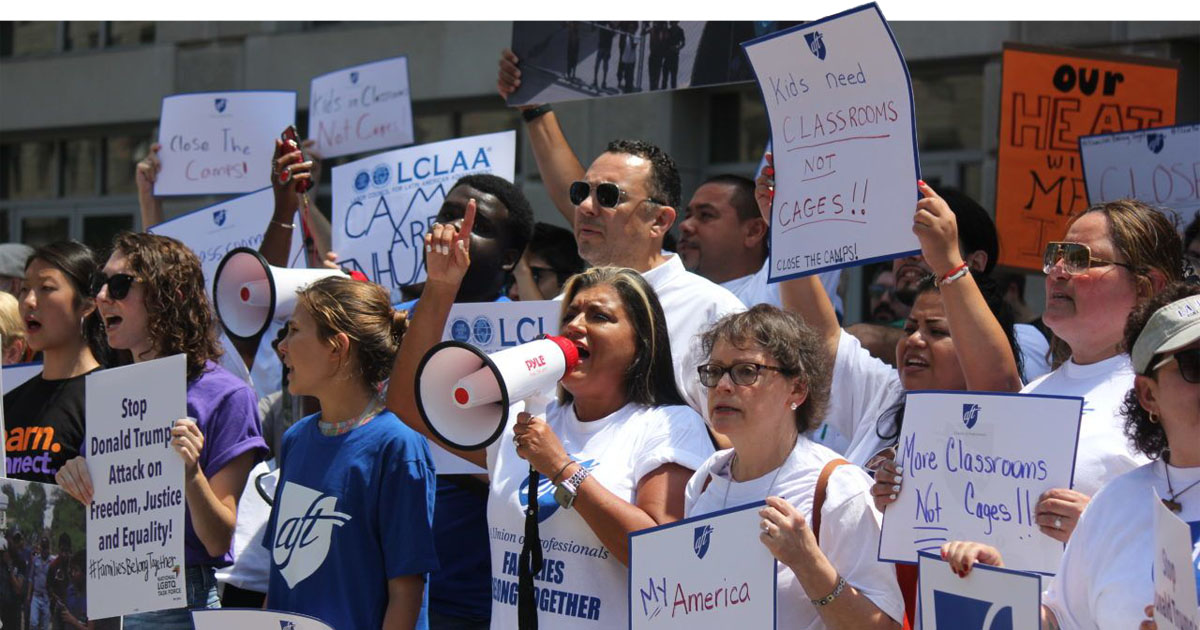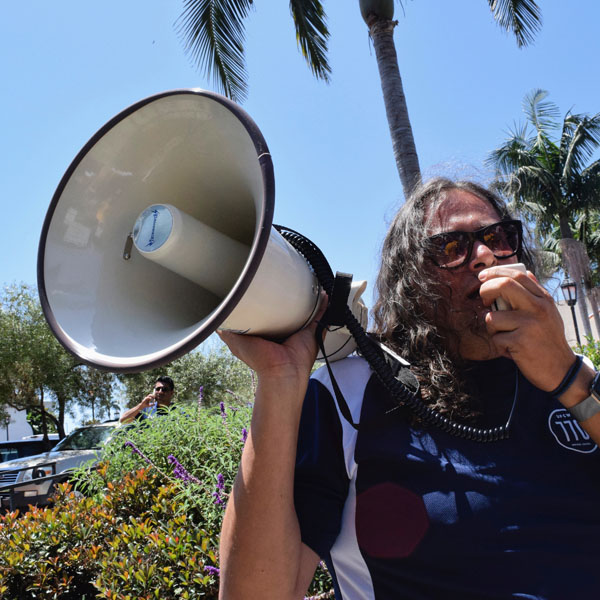W.S.L.C.
Join LCLAA to empower Latinx unionists
Rigo Valdez explains re-envisioned, broadened Pacific Northwest chapter
By KASI MARITA PERREIRA
(June 3, 2021) — As part of the ongoing work of the Washington State Labor Council, AFL-CIO on understanding race and the labor movement in our state, the WSLC has been highlighting leaders, organizations and campaigns that center equity, including our constituency groups of color. In February, we were reminded that Black History Month can be celebrated eyery day, March was Women’s History Month, and in April we supported APALA’s membership drive which continued into May Day (International Workers Day) and Asian Pacific American Heritage Month.
 Today we’re highlighting another AFL-CIO constituency group that has a long history in the Pacific Northwest: Labor Council for Latin American Advancement (LCLAA).
Today we’re highlighting another AFL-CIO constituency group that has a long history in the Pacific Northwest: Labor Council for Latin American Advancement (LCLAA).
JOIN TODAY! — Are you or are members of your union interested in LCLAA? Union members can sign up here for a $20 LCLAA membership. If you are from the Pacific Northwest, please select “Puget Sound” (for now) as your LCLAA chapter. Also, WSLC Executive Board Member Connie Rodriguez (LiUNA! Local 242) and others are hosting a LCLAA Info Session on Tuesday, June 8 at 5 p.m. Join using this Zoom link.
Recently, I had a conversation with Rigo Valdez, a LCLAA National Executive Board member who is now working locally on an innovative organizing project at MLK Labor, sponsored by the AFL-CIO’s President’s Organizing Initiative:
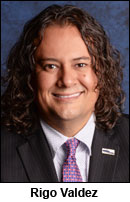 Kasi: Tell me more about how LCLAA came to be?
Kasi: Tell me more about how LCLAA came to be?
Rigo: We are the revamped LCLAA Pacific Northwest Chapter, an affiliate of The Labor Council for Latin American Advancement (LCLAA) a nonprofit, nonpartisan Latinx organization affiliated with the AFL-CIO. LCLAA formed in 1972 to provide Latinx trade members in the United States with a more effective voice within the AFL-CIO. LCLAA’s three main goals are to work with both unions and community groups to organize Latinx workers into unions; advance the social, economic, political, and civil rights of Latinxs by building coalitions with and among other unions and other national groups; and to promote Latinx participation in the democratic process. As a national organization, LCLAA also conducts research on a number of policy issues affecting Latinxs and non-citizen immigrant workers (whether Latinx or not). LCLAA is currently very active in the U.S. immigration policy debate. LCLAA also conducts voter registration, education, and mobilization efforts throughout each election cycle.
Kasi: So what prompted folks locally to form the organizing committee for LCLAA PNW?
Rigo: This past year alone has set new standards for how labor must fight for issues that impact communities of color. Fighting for racial justice has rekindled our need as Latinxs to come together and fight to support collective struggles. That is why we set out to form The LCLAA Pacific Northwest Chapter, a re-envisioning of the organization to include a wider network on Latinx unionists across the Pacific Northwest. We want to stay true to the original vision of LCLAA to fight for immigrant rights by promoting, through voter registration and Latinx election participation, humane policies that prioritize all immigrants. Lastly, we want to fight for Latinx representation within the Pacific Northwest Labor Movement. We need to come together to amplify within our labor movement and create strong solidarity bonds with other constituency groups (such as CBTU, APRI and APALA) and community organizations to advance justice for communities of color.
Kasi: It’s been really great seeing LCLAA PNW come together. So what can people expect by becoming a member?
Rigo: By becoming a LCLAA member you will be a part of the movement that actively and passionately defends the civil, social, economic and political rights of Latinx and immigrant working families. Your membership is crucial in helping us empower working families, as well as expand and invigorate labor unions and create significant alliances. As a member of the Pacific Northwest Chapter, you will have access to a vast network of Latinx labor leaders who like you, are eager to make a difference. We are striving to form stronger coalitions with community organizations, so far we have been honored to have Danielle Alvarado (Legal Director for Fair Work Center), Brenda Rodriguez (Washington Immigrant Solidarity Network, Eastern WA Network Coordinator), Dulce Gutierrez (Union, Community & Naturalization Organizer at WA State Labor Council — learn more about the WSLC’s Naturalization Clinic on June 5), and Marcos Martinez (Executive Director of Casa Latina), as part of our meetings. We are excited to welcome more speakers as we continue to grow. We have exciting opportunities ahead of us and want to include as many voices as possible in our organization. If you have questions about becoming a LCLAA PNW member send them our way, we can’t wait to meet you.
Kasi: Oh yes, I forgot to mention I’m a proud LCLAA member over here! But just in case someone reading this may want to join — what’s the easiest way to do that?
 Rigo: The easiest way to become a member is by visiting our LCLAA’s website and clicking on “Become a Member” tab. Once there you will be prompted to select a Chapter, select “Puget Sound” to join our local group. You can also like us on Facebook (LCLAAPNW) in order to get the most up to date info, as well as meeting invites. Help us reach our membership goal of growing by 50 members here at the Pacific Northwest Chapter.
Rigo: The easiest way to become a member is by visiting our LCLAA’s website and clicking on “Become a Member” tab. Once there you will be prompted to select a Chapter, select “Puget Sound” to join our local group. You can also like us on Facebook (LCLAAPNW) in order to get the most up to date info, as well as meeting invites. Help us reach our membership goal of growing by 50 members here at the Pacific Northwest Chapter.
Kasi: I just learned that APALA Seattle just became the largest chapter in the country — so it would be pretty awesome to meet (or beat) the goal of 50 members for LCLAA! What’s the best way to learn more?
Rigo: The best way to learn more about our organization is to come to our meetings. Join us for our next meeting on Tuesday, June 8 and help us get to our goal of growing our Pacific Northwest Chapter. Click here to join the Zoom meeting of LCLAA PNW on June 8 from 5 to 6 p.m. We hope to see you there!
Kasi: I’ll be there for sure. So while I have you, it would be great to share a little more about yourself since you bring decades of organizing experience here to our local movement. Can you give us an example of a union organizing campaign where management attempted to utilize “divide and conquer” strategies, particularly around race, and workers were able to overcome?
Rigo: I’ve had the good fortune to be a union organizer now for over 25 years and worked with a lot of great people and luckily won a lot of really great campaigns.
One of the campaigns that I worked on that was really life changing was the campaign to organize the workers at Smithfield in Tarheel, North Carolina. And certainly, that is one of the campaigns that really uplifts racial equity for me. Initially the workers in that particular plant were majority Black and Brown and the management really did an intentional job of pitting the workers against each other.
And this, I think, was one of these good examples of how a union and fairness and organizing can bring folks together despite the tensions of race amongst groups promulgated by management who was predominantly white. And so this campaign really did teach me a lot about racial equity and how the labor movement can be instrumental in breaking down racism, anti-Blackness. And, you know, people of color being pitted against each other.
Kasi: That’s actually the campaign where I first met you. It was also the first union election win I ever worked on — led by Black, Brown, Indigenous and immigrant workers and a super diverse team of organizers, I will never forget that. On that note, given Smithfield was over a decade ago, and thinking about where we are today. This past week marked the one-year anniversary of the lynching of George Floyd and 100 years since the “Black Wall Street” Tulsa Race Massacre. We’re still in a global pandemic, and we’re still organizing to build a strong labor movement that centers anti-racism and understands the implications of our inaction. So, given your experience and now that you’re here in the Pacific Northwest what do you see as the opportunities for organizing campaigns that center these values?
Rigo: Absolutely. I mean, equity in organizing starts in selecting organizing targets, and some would say that it even starts before that. It starts with building coalition with members of communities, especially here, Black and Brown communities, Indigenous communities that are the hardest hit by the pandemic. The recovery for workers of color, takes many forms: one could be unionization of workplaces that are predominantly BIPOC, because when we center those in organizing, we’re affecting communities. Economic justice is racial justice, so when we select targets that are predominantly BIPOC workers, and we negotiate a fair contract for them — this is life-changing. But we can’t do it by ourselves. The reality is that there is a mistrust by some communities of the labor movement, because in a lot of ways the labor movement has left BIPOC communities behind. And that is a bridge that we have to mend, and we mend it by becoming one with movements that center Black leadership, in movements for immigration reform, in movements of First Peoples to be recognized, in movements of LGBTQ folks to make sure they have the same rights as their straight counterparts.
And so I believe that constituency groups — let me correct myself — I actually call them equity-seeking groups because what we are doing in these groups is active. We actively seek equity within the labor movement and uplift outside of the labor movement. It’s the difference between servicing and organizing really that these groups, equity-seeking groups have a large, large role to play in bridging the gap and helping really uplift what the labor movement can do when it centers BIPOC folks in organizing and in building power.
Kasi: Agreed, it is so important to acknowledge the people and groups who have been doing the work within our unions and communities. So we talked about LCLAA earlier, which I understand you are a National Executive Board member and have been supporting the formation of our local chapter of LCLAA here. I did my homework and also learned you are a Board member of OUTReach and the President of United Latinos at UFCW which are also equity-seeking groups, not just in the United States but in Canada and Puerto Rico as well.
Rigo: So, I just want to tell you a little bit about myself. June is Immigrants’ Heritage Month, and I’m an immigrant – I immigrated to the United States from Mexico. It’s also Pride Month. I am in out Queer person. And I was born in June. So, all of the things come together for me in June.
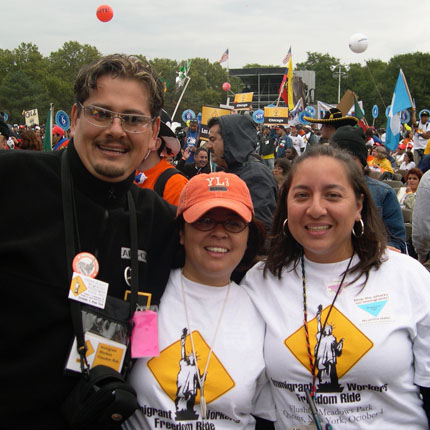 And so, yes I’m a Founding Board member of OUTReach, which is the LGBTQ+ equity seeking group within UFCW. I am the President of the United Latinos at the UFCW which is the equity-seeking group for Latinx folks within the UFCW in Canada, the United States and Puerto Rico — it’s a three country organization. And I serve on the National Executive Board of LCLAA. I joined LCLAA because I have been a staunch advocate of comprehensive immigration reform for a very very long time. In 2003 I had the honor of organizing the Immigrant Worker Freedom Ride bus out of San Francisco (we actually had two buses because you know the Bay is an overachieving area) and it became the thing in the labor movement I wanted to really uplift and so LCLAA seemed like the perfect place for it.
And so, yes I’m a Founding Board member of OUTReach, which is the LGBTQ+ equity seeking group within UFCW. I am the President of the United Latinos at the UFCW which is the equity-seeking group for Latinx folks within the UFCW in Canada, the United States and Puerto Rico — it’s a three country organization. And I serve on the National Executive Board of LCLAA. I joined LCLAA because I have been a staunch advocate of comprehensive immigration reform for a very very long time. In 2003 I had the honor of organizing the Immigrant Worker Freedom Ride bus out of San Francisco (we actually had two buses because you know the Bay is an overachieving area) and it became the thing in the labor movement I wanted to really uplift and so LCLAA seemed like the perfect place for it.
I just have always admired the work that LCLAA does at a national level. I also want to give a shout out to our Organizing Committee, which consists of Connie Rodriguez from the Laborers and Indira Trejo from UFCW. We hope that our local Organizing Committee expands, and we can complete the formation of this chapter and it all starts by joining today!
Kasi: Last question: I’m starting to ask all of our constituency groups this question because I learned in 2017, the WSLC passed a resolution in support of the formation of an Indigenous constituency group at the national level at AFL-CIO along with LCLAA and eight other state federations, and it got me thinking. Do you have a lesson learned or anything you would have done differently in reforming or creating a constituency or equity-seeking group within the AFL-CIO for the first time?
Rigo: I would say that reaching out to all of the other equity-seeking groups, and help them be a part of or ask them to be a part of your core formation, so that you don’t have to do this alone. Like, you don’t have to do this alone and I just want to uplift that folks from other equity-seeking groups within the AFL-CIO are an active part of the rebirth of LCLAA in the Pacific Northwest.
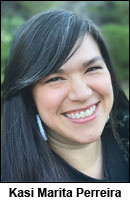 Kasi Marita Perreira is Director of Racial and Gender Justice for the Washington State Labor Council, AFL-CIO.
Kasi Marita Perreira is Director of Racial and Gender Justice for the Washington State Labor Council, AFL-CIO.

